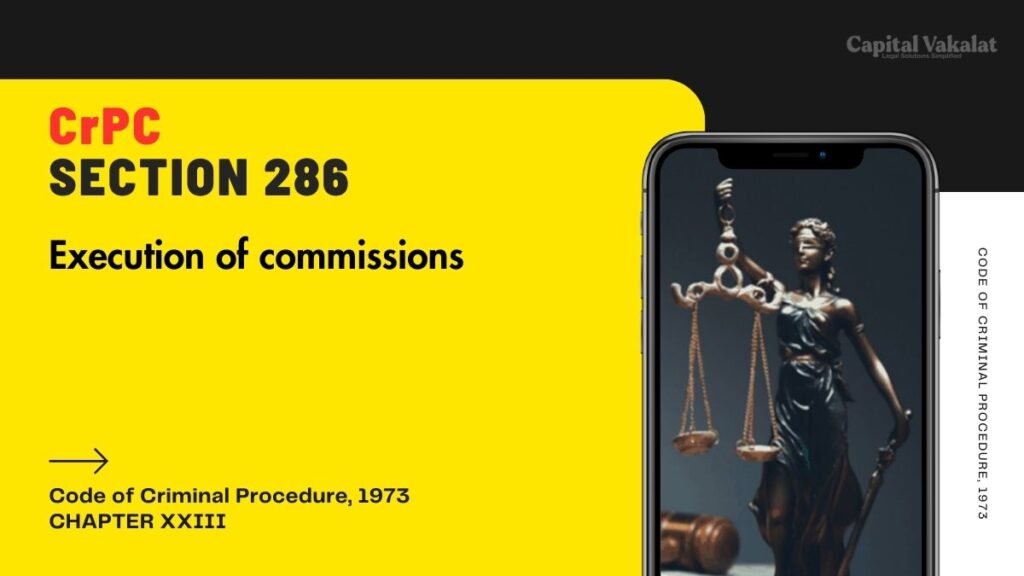Understanding Section 286 of the Code of Criminal Procedure (CrPC) is vital for anyone involved in the legal field. This section outlines the procedures for executing commissions, an essential part of gathering evidence and ensuring a fair trial.

The legal system in India, governed by various statutes and laws, aims to deliver justice efficiently and equitably. The Code of Criminal Procedure, 1973 (CrPC) is one of the critical legislative documents that lay down the framework for criminal law administration. Among its many sections, Section 286 deals with the execution of commissions, a crucial aspect that aids in the collection and examination of evidence. This article delves into the specifics of Section 286 CrPC, its application, and its significance in the judicial process.
Bare Act. Section 286 Cr.P.C.
Execution of commissions.
Upon receipt of the commission, the Chief Metropolitan Magistrate, or Chief Judicial Magistrate or such Metropolitan or Judicial Magistrate as he may appoint in this behalf, shall summon the witness before him or proceed to the place where the witness is, and shall take down his evidence in the same manner, and may for this purpose exercise the same powers, as in trials or warrant-cases under this Code.
Understanding Section 286 CrPC
Section 286 CrPC: Execution of Commissions addresses the method by which commissions issued by the court are executed. Commissions are essentially directives to perform a particular act, often related to gathering evidence that is crucial for a case. The execution of these commissions ensures that evidence is collected efficiently and reliably, maintaining the integrity of the judicial process.
Purpose and Scope of Section 286 CrPC
The primary purpose of Section 286 CrPC is to provide a legal mechanism for the collection of evidence that might not be readily accessible. This could involve examining witnesses who cannot attend court due to various reasons, inspecting documents located elsewhere, or other investigative tasks that require special directives.
The scope of this section is broad, covering various types of commissions such as those for local investigation, scientific inquiry, examination of accounts, or any other specific task that aids in the trial.
Issuance of Commissions Under Section 286 CrPC
A court may issue a commission when it deems it necessary for the ends of justice. The judge evaluates the necessity based on the circumstances of the case. For example, if a witness is critically ill and cannot appear in court, a commission may be issued for their deposition to be taken at their location.
Procedure for Execution of Commissions
Appointment of Commissioner: The court appoints a commissioner to execute the commission. This person could be a judge, magistrate, or any other competent individual deemed suitable for the task.
Commissioner’s Role: The commissioner’s role is to carry out the specific directives issued by the court. This might involve recording witness statements, inspecting sites, or examining documents. The commissioner acts as an extension of the court, ensuring that the evidence collected is reliable and presented accurately.
Report Submission: Upon completion of the commission, the commissioner submits a detailed report to the court. This report includes all findings, statements, and observations made during the execution of the commission.
Challenges in Execution of Commissions
Despite the structured framework, executing commissions under Section 286 CrPC can face several challenges.
Logistical Issues: Coordinating the logistics, especially in remote or inaccessible areas, can be a significant hurdle. Ensuring the presence of all necessary parties, such as witnesses, legal representatives, and the commissioner, can be challenging.
Compliance and Enforcement: Ensuring compliance with the commission’s directives can sometimes be difficult, particularly if individuals or entities are uncooperative. Enforcement mechanisms must be robust to address any such issues.
Accuracy and Reliability: The accuracy and reliability of the evidence collected through commissions are paramount. Any lapses or discrepancies can undermine the integrity of the judicial process.
Significance of Section 286 CrPC in the Legal Process
Section 286 CrPC plays a crucial role in the judicial process by ensuring that all relevant evidence is gathered and examined, even if it is not possible to do so within the courtroom. This section underscores the judiciary’s commitment to thoroughness and fairness, ensuring that no stone is left unturned in the pursuit of justice.
Real-World Applications of Section 286 CrPC
In practice, Section 286 CrPC has been instrumental in several landmark cases. For instance, commissions have been used to record testimonies of key witnesses residing abroad, inspect critical documents located in different jurisdictions, and conduct local investigations crucial to the case outcomes. These applications highlight the section’s flexibility and adaptability in various legal scenarios.
Judicial Interpretations and Precedents
The judiciary has interpreted Section 286 CrPC in various judgments, setting precedents that guide its application. These interpretations often clarify ambiguities and provide a roadmap for future cases. For instance, courts have emphasized the need for meticulous adherence to procedural requirements to ensure the validity of the evidence collected through commissions.
Impact on the Judicial Efficiency
By allowing evidence to be gathered through commissions, Section 286 CrPC significantly enhances judicial efficiency. It helps in overcoming geographical and logistical barriers, ensuring that trials proceed without unnecessary delays. This provision reflects the judiciary’s proactive approach to dealing with practical challenges in evidence collection.
Conclusion
Section 286 CrPC is a vital tool in the Indian legal system, facilitating the execution of commissions to gather essential evidence. Its structured approach ensures that justice is served efficiently and fairly, reflecting the judiciary’s commitment to upholding the principles of justice. Understanding and effectively implementing this section can greatly enhance the judicial process, ensuring that all relevant evidence is brought to light in the pursuit of justice.